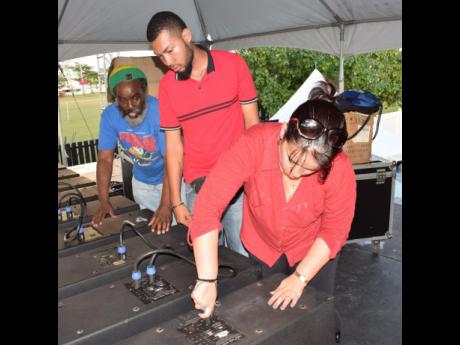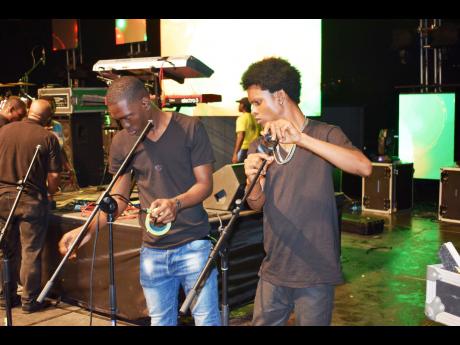British Council advances development of the festival economy in Jamaica
The British Council hosted its first festival skills seminar in Jamaica called Festival X, held on Wednesday, June 15, in collaboration with partners the Ministry of Culture, Gender, Entertainment and Sport and the Jamaica Cultural Development Commission (JCDC), This partnership saw the uniting of shared goals to strengthen Jamaica's cultural ecosystem, through building capacity in creative and cultural skills and supporting policy dialogue thereby enhancing the ongoing professionalisation of the cultural and creative industries in Jamaica.
The British Council's global approach to festivals is that festival skills are important, and festival managers from around the world must have the knowledge necessary to increase the sustainability and growth of festivals worldwide. Festivals are considered by global cultural sectors to be outlets of artistic expression, cultural development and inclusion. They are a significant part of the UK's cultural landscape, and the British Council aims to share the richness, quality, and diversity of festivals in the UK and Jamaica.
In the past three years, the British Council's Cultural Skills team, based in the UK, has worked through sharing skills, with festival in West Africa, Brazil, Indonesia, as well as Edinburgh, with plans to work further in the Middle East, China and South Asia, and now, the Caribbean. In this way, we are building a global network of festivals.
In line with this global approach and after several discussions with partners here in Jamaica the British Council Jamaica, included festival skills development as one of our two strategic areas of focus for our arts and creative economy work, the other being heritage. In Festivals, we have a strategy that involves capacity-building at three levels:
1) Backstage to the Future. A backstage festival skills programme for young people in sound engineering, lighting, and stage management, as well as core employability skills (Alpha Institute, Green Moon Festival (Colombia) Rebel Salute (Jamaica)).
2) International Festival Academy. For mid-level festival practitioners to learn about fundraising, sustainability, programming, marketing, and audience development, (KOTE, Jamaica Dance Umbrella and Manifesto JA as partners)
3) Momentum. For senior level Arts practitioners, where we host a team of 100 international delegates at the largest festival in the world - the Edinburgh Festival. (Latoya West-Blackwood/Book Industry Association of JA/Kingston Book Festival is the delegate this year)
In late 2017, British Council Global invited applications for a professional development short course at the International Festival Academy in Scotland and received 18 applications from local practitioners. Three of the 30 global spaces were allocated to Jamaica to Michael Holgate (Jamaica Dance Umbrella), Enola Williams (KOTE), and Lesly-Ann Welsh (Manifesto Jamaica).
HIGH QUALITY APPLICANTS
The quality of all 18 applications from Jamaica was so high that the International Festival Academy and the British Council understood the need to do more than support the participation of delegates. In response to the clear demand for training in this area, they provided the three Jamaica participants with educational material from the sessions in the UK to assist them with sharing the knowledge on their return to Jamaica.
With this in mind, Festival X, a festival skills seminar that was held on June 13, was born, with a view to cascading the knowledge gained by the three Jamaica participants to the International Festivals Academy in Edinburgh to the wider community of festival practitioners across the country.
In her article on the specificities of the cultural product, Assassi (2003) highlights the difference between a work of art and a cultural product, noting the central role individuals she describes as "mediators" play in the transition of the work of art to saleable product, and consequently, the "transition from cultural value to economic value". Festival professionals are these mediators. They play a very important role in the creation of economic value for our cultural and creative products.
Before the showcasing event takes place, the works of art start out as a song, a book, or a dance performance, among others.
Festival professionals then interpret the cultural value of that work of art into economic value by creating an experience that people want to spend their money on. The distribution of artistic goods or services, via festivals or other means, plays an essential role in transforming the artistic work into a "product for sale" to the public. Thus, festival professionals and other mediators (galleries, movie houses, art critics, etc) contribute to the value chain in a very significant way.
Assassi further states in her article that "whether the product is bought or made available momentarily" (as in the case with festivals), "there is a commercial transaction, whatever its terms, between a producer and a distributor on the one hand and between a distributor and consumers on the other". Festival professionals curate the passage from artistic work to consumable cultural product.
Without festivals, an audience, or the public, might never discover that they like a particular singer and then go on to buy all their albums. They might never realise that their favourite designer, writer, or chef has created something that will forever be of immense value to them. Festivals are absolutely essential in the development of a robust and sustainable creative economy. It's how the consumer window-shops, and they form part of a sustainable income-generating cycle, a cluster: work of art mediator creative and cultural entrepreneur the consumer creative economy.
Festival practitioners must know that they can harness and build on their awesome power. They must coordinate it, leverage it, and make it work for them as a collective. Because we at the British Council believe in the power of festivals, we are making available a small grant of J$250,000.00 to support the creation of a festival sector umbrella body. This is one of the ways we engage and invest in our stakeholders in civil society, education, and the arts and facilitate the exchange of information, learning, and partnerships.
- Olayinka Jacobs Bonnick is country director, British Council Jamaica.


